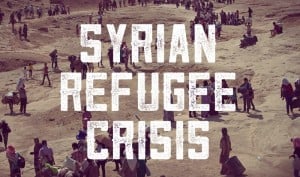“They watched Jesus to see whether he would cure him on the sabbath, so that they might accuse him. And he said to the man who had the withered hand, ‘Come forward.’ Then he said to them, ‘Is it lawful to do good or to do harm on the sabbath, to save life or to kill?’ But they were silent. He looked around at them with anger; he was grieved at their hardness of heart.” – Mark 3:2-5
The first time I was exposed to extreme hunger – albeit still in a very limited and sheltered way – was in high school. My church youth group participated in a lock-in in which each of us got sponsors to donate money if we fasted for 30 hours. It was the longest I had ever been with food. As the gnawing, cramping ache in my stomach faded into a dull headache and feeling of listlessness, I learned about children younger than me for whom the concept of being full was as foreign as starving is to me. We ended the fast by sharing in communion. The broken body of Christ takes on new meaning when you’re envisioning emaciated children. This was the point of the 30 Hour Famine sponsored by World Vision.
World Vision has made tsunami size waves this past week with its decision and then immediate reversal on hiring homosexual staff members. My immediate reaction is anger at how horribly World Vision has handled a controversy that is entirely of their making. The obvious fact that their decision came as such a shock to allies and opponents alike – not to mention that somehow they hadn’t already evaluated the possible financial implications – not only shows incredibly bad strategy, but more significantly that they failed to do the pastoral and relational work that would have enabled their decision to stand. They tried to be courageous and instead were reckless. And so many of us who were proud are now betrayed.
In addition to being angry, I am filled with grief. Once again the church I love is harming people I love. And I am weary – Chick-fil-A, Duck Dynasty, Fred Phelps, now World Vision – how long, O Lord, will this endure? In response to these emotions, I see a few options. 1) Fill ourselves with righteous anger, pull our own money (such as it is) from World Vision’s operating budget and pressure corporate sponsors to do the same (though I’m not certain even their deeper pockets can go dollar for dollar against the financial interests that pressured World Vision to reverse itself). 2) We can take a pass because strategically there’s not much of an impact we can have here and risk sending the message (again) that the voices of discrimination will always win. 3) We can look to the Gospel.
In the passage from Mark above, Jesus’ opponents (the ones who would eventually crucify him) trap Jesus in a choice between violating the laws of the sabbath or responding to the human suffering in front of him. His response is a direct challenge to all of us who value our doctrinal beliefs more than the people we encounter. Our duty is to the person, Jesus says; the law was made for man, not man for the law. Even the Apostle Paul makes it clear that being blameless before the law is completely meaningless if we do not have the love of Christ. This is the point Pope Francis was making when he famously responded to a question about homosexuality by saying that we must consider and care for the person above anything else.
There are people suffering as a result of these doctrinal squabbles. Every child who will be denied food because a pro- or anti- gay activist pulls funding from World Vision is a suffering person in our midst. Is it really Christian to deny food to the hungry because we disagree with our brothers and sisters in Christ? Can we ignore the pain that this reversal by World Vision is causing a gay teenager who once again is being told the Church has no place for her? Even if you believe homosexuality is a sin, is it honestly a moral stance to say to a gay man who wants to devote his life to the poor that we would rather let them starve? It would seem the Gospel offers a pretty resounding “No.” In the text, when others try to put the law before one of God’s children, Jesus’ response is anger and grief.
I wrestle a lot with holy anger because no matter how justified it is – and anger at injustice and suffering is justified – anger almost always leads me to my worst self. But the idea of public grief is compelling – grief is really the root of anger anyway. We tend to prefer anger to grief because anger makes us feel strong and justified. We associate grief with being impotent, beaten, and broken. The trouble is, responding with anger to those who have grieved us comes across as an attack and more often than not provokes the fight or flight reflex of retaliation. Retrenchment inevitably ensues, an eye for an eye rather than an embrace. And far from being impotent, grief is in reality a radical act of nonviolence. When it is publicly displayed and vocalized, when we refuse to return evil for evil, our opponents are left with the choice of either attacking those who have voluntarily laid down their arms (a pretty bad PR move) or engaging with our humanity. Admittedly, effective nonviolent resistance isn’t easy. That’s probably why it’s so rarely tried. But Jesus doesn’t call us to what’s easy.
The question that looms large in all this mess is, “Where is God?” We like to think of God in terms of sides – God’s either on our side or theirs, we’re either on God’s side or not. But I think God might instead be on the sidelines, weeping that battle lines are again being drawn. It’s the season of Lent and I can’t help but think of the wounded and broken God, the one who suffers and who reaches out to others who suffer too. I think the suffering God is with the children whose lives are being jerked around by privileged people in a wealthy country. I think the wounded God is with my LGBT brothers and sisters who have endured so much pain at the hands of Christ’s followers. And I think the grieving God is even with the World Vision executives trying to be faithful witnesses and serve a hurting world.
Envisioning a grieving God actually flips the idea of sides on its head. If we want to be on that God’s side, then the question is no longer about who is right or wrong. Instead, much more important questions emerge. How do we respond to God’s hurt? How do we answer the call to love the suffering person in our midst? How do we treat to our opponents, not as a matter of law, but according to their humanity? The answers might surprise us and maybe, just maybe, draw us one step closer to the reconciliation for which we all long.
Follow Rachel on twitter at @rachelnoelj











